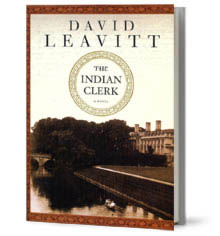Novel
THE INDIAN CLERK
BLOOMSBURY, 2007
On a January morning in 1913, G. H. Hardy—eccentric, charismatic, and, at thirty-seven, already considered the greatest British mathematician of his age—receives in the mail a mysterious envelope covered with Indian stamps. Inside he finds a rambling letter from a self-professed mathematical genius who claims to be on the brink of finding a solution to the Riemann Hypothesis, the most important unsolved mathematical problem of all time. Some of his Cambridge colleagues dismiss the letter as a hoax, but Hardy is convinced that the Indian clerk who wrote it, Srinivasa Ramanujan, deserves to be taken seriously. Aided by his collaborator, Littlewood, and a young don named Neville who is about to depart for Madras with his wife, Alice, Hardy determines to learn more about Ramanujan and, if possible, persuade him to come to Cambridge. It is a decision that will profoundly affect not only his own life and the lives of his friends, but the entire history of mathematics.
Based on the remarkable true story of the strange and ultimately tragic relationship between an esteemed British mathematician and an unknown—and unschooled—mathematical genius, and populated with luminaries such as D. H. Lawrence, Bertrand Russell, and Ludwig Wittgenstein, The Indian Clerk takes this extraordinary slice of history and transforms it into a story about the fragility of human connection and our need to find order in the world.
BUY Amazon barnes & noble indiebound
ON The Indian Clerk
“Leavitt has a passion to inhabit the past, a particular novelistic impulse that goes beyond simple ‘animation’ of history. The research that went into The Indian Clerk is impressive, but a good historical novelist has to do much more than get the facts right: he has to illuminate the relationship of his own time to the period he’s writing about The Indian Clerk is a story about guilt. It’s about the impulse to save a foreign stranger (in spite of the fact that your idea of his country is no more than a couple of colorful clichés), and a story about a war in which the boys who die are most often poorer than the ones who stay at home. Reading it offers the pleasure of escape into another world, along with the nagging feeling of familiarity that characterizes the best historical fiction.”
—Nell Freudenberger, The New York Times Book Review (front page)
“This melancholy novel, set in Cambridge around the start of the First World War, focuses on the real-life partnership between the British mathematician G. H. Hardy and his Indian protégé Ramanujan. Hardy, astonished by the genius of Ramanujan—who, largely unschooled, writes rudimentary proofs that are brilliant even in their mistakes—campaigns to have him brought to England on a scholarship, and then pushes him toward solving the infamous Riemann hypothesis. Leavitt delicately suggests ways in which Hardy’s willful blindness toward human weaknesses and Ramanujan’s sublimation of physical and emotional pain into the abstraction of equations lead slowly and inextricably to the young man’s death. Mathematics and its paradoxes provide a deep vein of metaphor that Leavitt uses to superb effect, demonstrating how the most meaningful relationships can defy both logic and imagination.”
—The New Yorker
“This is a quiet interior world of ruminations, equations, tea trays, and faded carpets in which any disruption—sex, anger—is all the more shocking. Much happens, of course, chiefly the war, which materializes dreadfully in Cambridge when hundreds of wounded soldiers are billeted there…Hardy and even the minor characters around him are so finely drawn that no single act or relationship defines them. ‘Whenever you seem to be getting close to seeing the whole in all its lovely symmetry,’ Hardy reflects, ‘mathematics throws you a ball you can’t hit. ... You cannot cheat there. You will always be caught out.’ Life, by contrast, leaves the summing up to memory and conscience; Leavitt's rich novel convinces us that it could not be otherwise…[P]sychological depth, artistic skill, and academic rigor distinguish The Indian Clerk…”
—Anna Mundow, The Boston Globe

Foreign Editions
Allen & Unwin (Australia)
Ediouro (Brazil)
Denoel (France)
Polis (Greece)
Europa (Hungary)
Yedioth Ahoronoth (Israel)
Mondadori (Italy)
Nikkei Business Publications (Japan)
De Harmonie (The Netherlands)
Teorema (Portugal)
Anagrama (Spain and Latin America)
Bloomsbury (United Kingdom and Commonwealth)
Awards & Honors
IMPAC/Dublin Award
A 2008 Kiriyama Prize Notable Book
New York Magazine’s Best Historical Novel of the Year
A New York Public Library Book to Remember for 2007
A New York Times Notable Book
PEN/Faulkner Prize Finalist
Finalist for the Premio Grinzane-Cavour
A Stonewall Book Award Honor Book
notes
Read an excerpt from The Indian Clerk.
I talk about The Indian Clerk with Scott Simon on NPR’s Weekend Edition Saturday.
